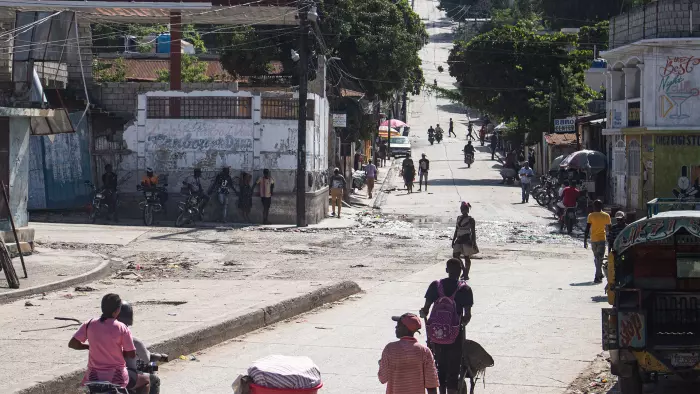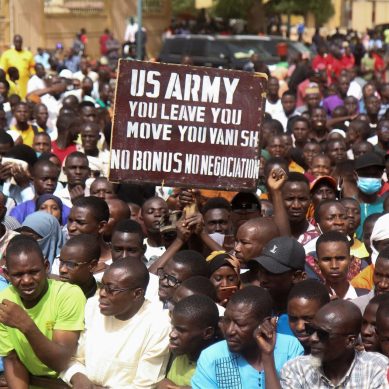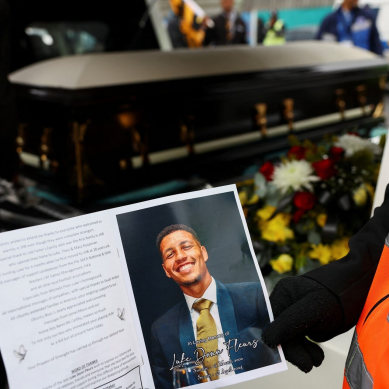
Last month, the UN Security Council authorised an international force to help Haiti fight gang violence. But what do Haitians themselves really think about it?
As Kenya’s parliament and courts wrestle with whether to approve the East African nation’s bid to lead the deployment – not a UN peacekeeping mission, but a US-backed and largely US-funded policing effort – The New Humanitarian sought out Haitians from different walks of life to find out their perspectives.
Haiti is suffering a deepening humanitarian crisis, marked by extreme hunger and poverty, and its citizens are anxious for any relief from the rampant killings and lawlessness, but these individuals – from a judge to a displaced person, from a policeman to a rapper – expressed mixed feelings about any foreign intervention.
The force was approved by the UN in early October, a year after de facto Prime Minister Ariel Henry requested it. However, the High Court in Kenya, which was slated to lead the mission, then blocked the deployment of 1,000 Kenyan police officers after opposition politicians filed a lawsuit arguing that it was unconstitutional.
After some delays, a ruling on the case is now expected on November 16, a court assistant told The New Humanitarian.
In the meantime, Interior Cabinet Secretary Kindiki Kithure responded to Kenyans’ rising concerns over the mission by insisting that: “Kenya will not allow its troops to exit the country for Haiti until all the required resources, including equipment and finances, are mobilised and availed”.
“The cost of deployment will be borne by United Nations member states through voluntary contributions,” Kithure added in a post on X, the social media platform formerly known as Twitter.
Up to a dozen countries, including Kenya, have committed to support the force, which the United States has long been pushing for, saying it is essential to restore security before new elections can be held.
Henry has been installed as de facto leader since the July 2021 assassination of President Jovenel Moïse – an event that led to a dramatic rise in gang violence and a weakening of Haiti’s now unelected institutions.
Some are sceptical about an effort that doesn’t primarily involve Haitians, especially one that is led by Kenyans, who do not speak French or Kreyol (Creole) and whose security forces have a record of human rights violations.
Others are hopeful the mission will break the grip of the gangs, who control most of the capital, Port-au-Prince, and large parts of the surrounding Artibonite department.
More than 200,000 people have been displaced by recent violence, 44 per cent of the population faces acute food insecurity, more than 2,400 people were killed by gang violence between January and mid-August alone, while countless women have been raped amid the growing impunity.
A poll released by the Haiti Health Network on 31 October showed that 70 per cent of the approximately 1,600 respondents were in favour of the mission. But some are concerned, especially bearing in mind what happened in the past with MINUSTAH – the UN “stabilisation” mission accused of sexual abuse and exploitation, and blamed for a deadly cholera outbreak.
The testimonies that follow — edited for length and clarity — reveal what Haitians face daily, and their thoughts on the deployment of foreign security forces.
Mario Andresol, 63, former candidate to the presidency (2016), and director of the Haitian National Police from 2005 to 2012:
We’ve lost the momentum to solve the problem ourselves. In Haiti, there was a problem of public security, on top of which came a problem of national security, [of displacement, and a humanitarian crisis]. Today, we don’t have institutions capable of responding to these challenges.
There always were small bandits who committed crimes, but they were contained. In the 2010s, the situation deteriorated rapidly as the Haitian National Police (PNH) lost control of weapons entering the territory and, at the same time, gangs developed very quickly. It has become a national security problem that goes beyond the Haitian police… We’ve lost the momentum to solve the problem ourselves.
Since Haiti does not currently have an army, we need armed support — from Kenya for example — capable of helping to regain control of lost territories. But the Haitian police will continue to have a role to play. An international force can intervene for a specific time to dismantle the gangs in the neighbourhoods, but the work of daily security must fall on to the national police, who know the territory and have a relationship with the population that will last over time. They must be the ones ensuring the day-to-day safety of the Haitian people.
Jean Léonard Tout-Puissant, a.k.a. Izolan, 42, rapper with the popular group Barikad Crew:
Living in Port-au-Prince is like living in a prison.
Today, we have a country that doesn’t exist. Haitians tear each other apart and denigrate each other. I was born here, I’m living here, but it’s all discouraging.
All Haitian artists are looking to move abroad because nothing works here. There’s no nightlife, no calendar of shows, no perspectives. Living in Port-au-Prince is like living in a prison. We need a solution to this.
Worse, when you’re a Haitian artist and a neighbourhood chief (that is what he calls gang leaders) asks you to come and play for him, you must go or you risk your life. But we also risk our lives by going there, because the police often shoot at us when they see us entering these neighbourhoods… The only solution is to leave the country. But we can’t all leave the country.
I’m in favour of an armed force coming to help us. Not to mistreat us, but to help us…
We hope the next force will work with the PNH to strengthen the institutions, and to leave something for the country when they pull out of Haiti.”
Paul W. 39, (his full name is not being disclosed for security reasons), driver and displaced person:
Not even a foreign force can change this reality.
I was living in [the] Carrefour-Feuilles [district of Port-au-Prince] with my wife and our six-month-old child when the gangs attacked our neighbourhood. We had to flee quickly, under bullets, without being able to take anything with us, just our lives. On August 16, 2023, the bandits came, stole everything we had, and set the house on fire.
My wife and I took refuge in a school further away. As our baby was still an infant, I didn’t want to stay in a public square. We have nothing left. We don’t even have a mattress to sleep on; we just use bits of cardboard.
I’m a driver. I don’t earn much, less than $200 US a month. My wife doesn’t work. She is totally dependent on me. I live thanks to a few friends who help me, but the situation is very difficult. I hope to find humanitarian aid from an organisation soon.
For me, not even a foreign force can change this reality. After all, we’ve already had foreign forces in the country on several occasions… but it didn’t prevent the situation from deteriorating. Politicians and other Haitians like me need to be conscious of our situation and take actions to change it.
I want to leave the country. I want to go to Cuba because my wife must undergo cervical surgery, and it is relatively easier to go there than to other countries. I’m asking some people for help with this. There’s no point in building a life here.”
- The New Humanitarian report











